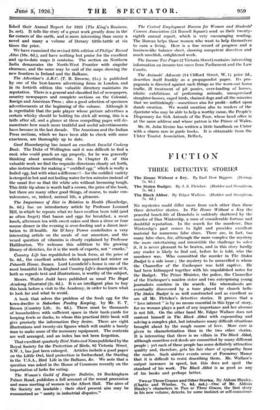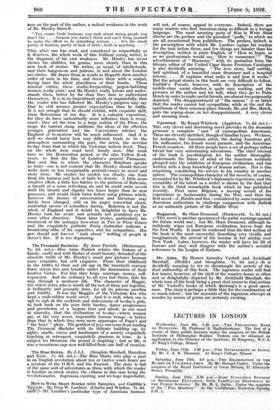Two or Three Graces and Other Stories. By Aldous Huxley.
(Chatto and Windus. 7s. 6d. net.)—One of Mr. Aldous Huxley's characters in Two or Three Graces, the first story in his new volume, detects. by some instinct or self-conscious',
mess on the part of the author, a radical weakness in the work of Mr. Huxley himself. '
" You create futile business, you rush about seeing people you don't like . . . because you daren't think and can't bring yourself to make the effort to do something serious.. . . It's the result partly of laziness, partly of lack of faith—faith in anything. . . ."
This, after one has read, and considered as respectfully as it deserves, the whole work of this brilliant young writer, is the diagnosis of his own weakness. Mr. Huxley has never shown his abilities, his genius, more clearly than in this new book of stories. He writes, as usual, of intellectuals, and their hangers-on and patrons, in and about the London art-circles. He draws them in words as Hogarth drew another order of men in his time, and draws them with a scalpel, laying bare the whole ghastliness of their hearts. These musical critics, these studio-frequenting, jargon-babbling women, really exist ; and Mr. Huxley really knows and under- stands them, better by far than they dare to understand themselves. It is in no impertinent spirit., or ungratefully, that the reader who has followed Mr. Huxley's progress may say that he still arouses greater expectations than he fulfils. It is not enough that he should exhibit, with exquisite skill, these Bohemians of our day. It is a valuable exposition, for they do have undoubtedly more influence than is recog- nized : they set the tone to a large section of the Press, the stage, fix current slang, infiltrate the ideas of the effective younger generation and the Universities whence the England of to-morrow will be much influenced. And it is well we should know how very different tends to be the atmosphere surrounding the poet, the artist, the novelist to-day from that in which the Victorian writers lived. They on the whole were roast beef, family men. One must turn to the Restoration period, or the slim Yellow B3ok years, to find the like of London's present Parnassus. But—and this is where the character Kingham speaks so truly—one is not content that Mr. Huxley should forever write more or less recognizable portrait-essays in novel and story form. He studies his models too closely, one fears from the laziness and lack of faith he detests. A little more creative effort, a little less fidelity to the purlieus of Bohemia, a breath of a more refreshing air and he could write novels with the breath and dignity ten times larger than he now possesses, and would think twice before using phrases which, however the licence of conversation and literature may lately have changed, still on his pages somewhat shock, somewhat savour of schoolboy daring. Bohemia is not the whole of England and it would be delightful to have Mr. Huxley turn his acute and actually not jaundiced eye in some other direction. These later stories, particularly his treatment of the unhappy love-story in Two or Three Graces and the exquisitely pathetic Fairy Godmother indicate a broadening alike of his capacities, and his Sympathies. His pen Should not forever " rush about " writing of people it doesn't. like. It is too depressing.











































 Previous page
Previous page